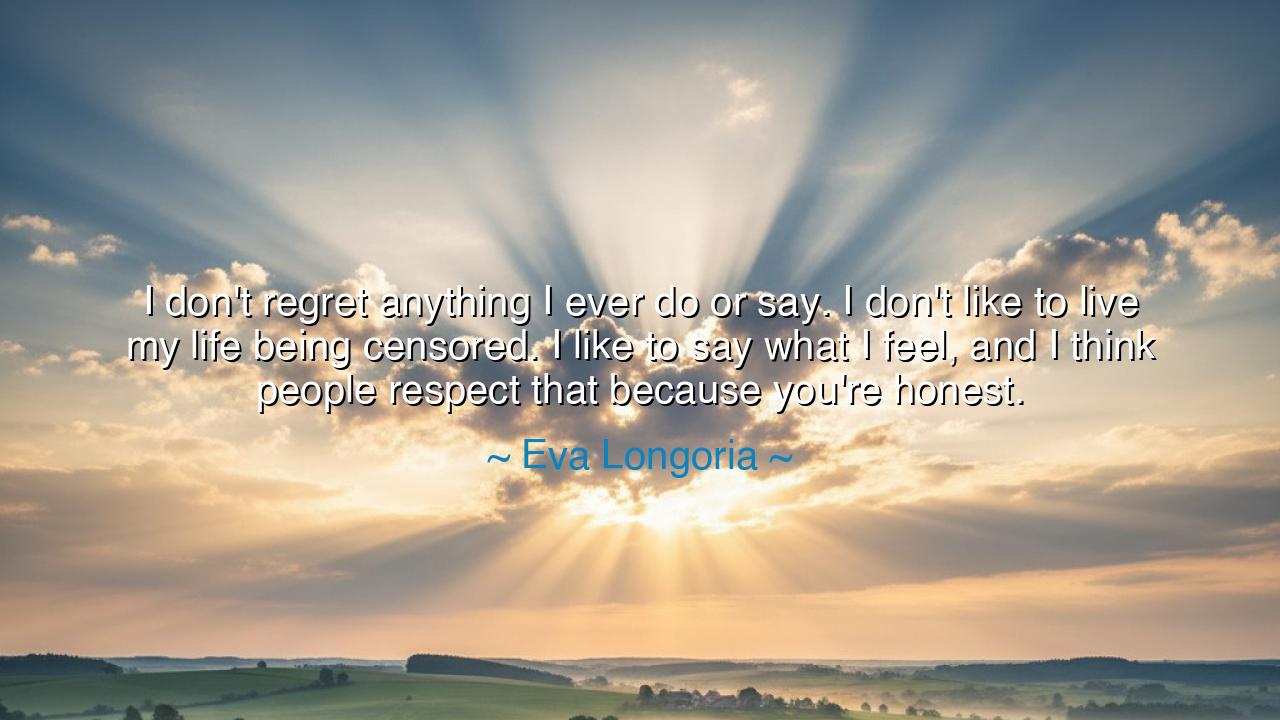
I don't regret anything I ever do or say. I don't like to live my
I don't regret anything I ever do or say. I don't like to live my life being censored. I like to say what I feel, and I think people respect that because you're honest.






"I don't regret anything I ever do or say. I don't like to live my life being censored. I like to say what I feel, and I think people respect that because you're honest." These words from Eva Longoria speak to a fundamental truth about the power of honesty and authenticity. Longoria’s declaration is a call to embrace our true selves and to live without the chains of censorship, where one’s actions and words align with their inner convictions. In a world where it is all too easy to hide behind facades or conform to external expectations, this quote encourages us to live with integrity and to honor the freedom that comes from expressing our genuine thoughts and feelings.
In the ancient world, this idea of truth-telling and authenticity was deeply revered, though often dangerous. Socrates, the great Greek philosopher, was sentenced to death for questioning the norms of Athenian society and for encouraging others to think critically and speak their truths. His belief in the power of honesty and the importance of self-examination was so profound that he chose to face execution rather than abandon his principles. Socrates famously said, “The unexamined life is not worth living.” His commitment to living truthfully, without fear of societal judgment, reflects the essence of what Longoria champions in her words—living a life of honesty, regardless of the consequences.
This respect for truth also permeates the Roman ideals, where figures like Cicero, a renowned statesman and philosopher, exemplified the importance of speaking truth to power. Cicero’s speeches, which often challenged the ruling class, earned him both admiration and enmity. His refusal to compromise on his principles, even when it led to political exile and death, demonstrates the high price of living authentically. For Cicero, like Socrates, true respect came from a steadfast commitment to truth, even when it was inconvenient or dangerous. These figures from ancient history show us that honesty and authenticity have always been both a source of power and a burden, for they often conflict with the expectations of others.
In more modern times, Longoria’s stance on honesty and authenticity can be seen in figures such as Mahatma Gandhi, who lived his life with an unwavering commitment to truth and non-violence. Gandhi believed that truth was the highest form of freedom, and he often spoke out against the oppressive systems of his time, even when it meant standing alone against powerful forces. Like Longoria, Gandhi was unafraid to speak his truth, regardless of the consequences. His honesty and integrity earned him not only the respect of his people but also the admiration of the world. Gandhi’s commitment to being honest with both himself and others illustrates how truthfulness in the face of adversity can become a source of immense strength.
Longoria’s words also remind us of the modern dangers of censorship and the fear of speaking out. In today’s world, many are driven by a desire for approval or are constrained by the judgment of others. This often leads to a life that is lived in the shadows, where self-expression is suppressed for the sake of maintaining comfort or avoiding conflict. However, as Longoria suggests, the true path to respect and freedom lies in honesty—in saying what we feel, in expressing our genuine thoughts, even if they challenge the status quo. This is not about recklessness but about living with authenticity and integrity, knowing that it is through being true to oneself that we truly connect with others.
The lesson here is clear: honesty and authenticity are the pillars of a life well-lived. While they may not always win us the favor of others or bring immediate success, they build the foundation of self-respect and genuine connection. Just as Socrates and Cicero stood by their truths in the face of opposition, so must we stand by our own voice and live in alignment with our core beliefs. To live truthfully is to live without regret, knowing that our words and actions reflect our truest selves.
In our own lives, we should strive to be more like these figures—more honest, more authentic, and more willing to speak up and live in a way that is aligned with our true selves. This doesn’t mean speaking without thought or disregarding the feelings of others, but rather, it means being true to our values and expressing ourselves openly. In a world that often encourages conformity, honesty is an act of rebellion and freedom. By embracing our authentic selves, we not only gain the respect of others but also find peace and empowerment within ourselves. Let us, like Longoria, live without fear of censorship, knowing that in the end, it is truth that earns us the deepest respect and the greatest freedom.






AAdministratorAdministrator
Welcome, honored guests. Please leave a comment, we will respond soon